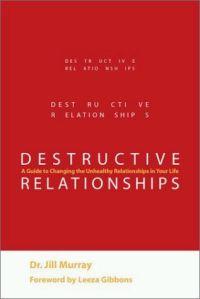

Purchase
Destructive Relationships: A Guide to Changing the Unhealthy Relationships in Your Life
Jill Murray
destructive relationships are so common as to be the rule rather than the exception in many women's lives today. In fact, she claims that many women suffer from a whole host of toxic relationships.
Jodere Group
September 2002
350 pages
ISBN: 1588720268
Hardcover
Add to Wish List
Non-Fiction
Nearly all of us, at one time or another, have faced one of
the following: A critical parent, an unkind spouse,
unappreciative children, a demanding boss, back-stabbing
coworkers, or gossipy friends. If these relationships have
caused you to feel depressed, anxious, sick, hopeless,
abandoned or emotionally depleted, then you may have been
in a destructive relationship.
Dr. Jill Murray, in her new book DESTRUCTIVE RELATIONSHIPS:
A Guide To Changing The Unhealthy Relationships In Your
Life (Jodere, September 2002), says that destructive
relationships are so common as to be the rule rather than
the exception in many women's lives today. In fact, she
claims that many women suffer from a whole host of toxic
relationships. For example: Judy has a mother who makes
little "suggestions" every time she visits: Judy's house
isn't clean enough, her children aren't dressed warmly
enough, she doesn't brown her chicken well enough, she
isn't a good enough wife, and—oh, by the way—did she gain a
few pounds recently? Judy tries to ignore her mother's
comments; she's used to them, having grown up with
criticism all her life and besides, her mother is getting
older—she doesn't want to hurt her feelings. Judy also
works for a boss who constantly demands more of her than
anyone else in the department. She is often asked to work
late, her reports aren't quite up-to-snuff, and she doesn't
take enough initiative. Judy rationalizes that her boss is
a creative genius and like all geniuses, he's a bit
eccentric. Judy has kids who treat her like a maid, taxi
driver, and ATM but you know kids these days—they all have
an attitude; it's just part of growing up. She also has
girlfriends who betray the confidences she shares and a
husband who often "kids around" with her by making caustic
remarks about her appearance and libido. Does any of this
sound familiar? So, how can you find new, healthier ways of being?
According to Dr. Jill the first step is to recognize the
signs of a destructive relationship. They can be verbally
abusive, which may include name-calling, critical comments,
threats, or lies. They may be emotionally abusive, which
include such behaviors as humiliation in public or private;
demeaning one in order to make them feel small and weak
or "less than;" being jealous, possessive, or controlling;
intimidation; demanding to know where one is at all times
or using interrogation techniques; blaming someone else for
difficulties or disappointments; being a "user." Sexually
abusive behaviors include sexual harassment or
discrimination (on the job, for example); sexual coercion
or assault; or being sexually demanding. Physical abuse
involves such behaviors as pushing, striking, choking,
restraining, or not letting one leave a room. The next step in ridding yourself of destructive
relationships is to figure out what brought you to them and
why you remain. Dr. Jill believes that people act the way
they do because they get a "payoff" for their behavior.
Before you extricate yourself from a destructive
relationship, you must decide if the cost is dearer than
the payoff you have received. These relationships often
cost you your self-respect, your happiness, your integrity,
your sense of gratitude, and your spirit. Learning to stand up for yourself is a critical part of
creating healthy relationships. In her book Destructive
Relationships, Dr. Jill provides strategies to: **overcome the need to people-please
**uproot poor self-esteem and reclaim your power
**identify your fears and banish them through positive
steps
**let go of shame and guilt, thereby eliminating the need
to keep secrets
**establish boundaries
**free yourself from no-win coping behaviors such as
denial, minimizing, shopping, overeating, compulsive sex,
drug or alcohol use. The point is to realize that you deserve to be happy and to
set and maintain boundaries
Comments
No comments posted.
Registered users may leave comments.
Log in or register now!
| 


 © 2003-2025 off-the-edge.net
all rights reserved Privacy Policy
© 2003-2025 off-the-edge.net
all rights reserved Privacy Policy